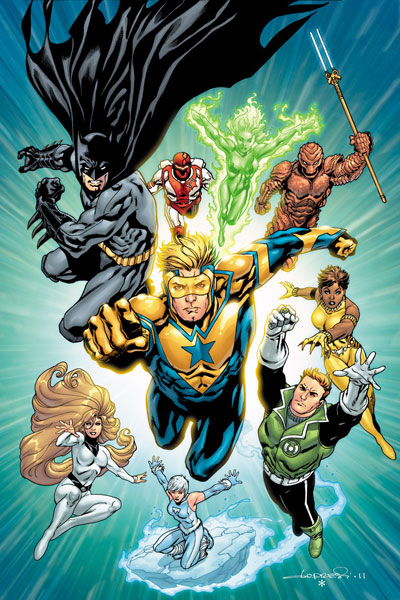It's been brought up time and again that Marvel has very few female-led titles and, as a counter-point, DC is comparably heavy with them. A closer look at the shelf reveals something unusual, however: Marvel actually has very few individual hero books at all. They have nearly twenty separate titles dedicated to the X-Men and the Avengers while DC has nearly ten dedicated to Batman alone (nevermind his extended...family? Helpers?) In fact, well over half of Marvel's catalog consists of team books while DC is the exact, polar opposite. Is there any rhyme or reason to this and is there any way to break the mold?

This is going to read a bit more like a historical analysis rather than an editorial one because there is one single simple answer: DC Comics began as a series of solo books, many of which weren't even under the same publisher letalone the same universe. Marvel's books, on the other hand, with some notable exceptions, take place in the same universe and did (essentially) from the start. Spider-Man would websling across the New York skyline in a Daredevil book, the Fantastic 4 would help out Professor X's X-Men if they ever had a scientific query and Dr. Strange ministered mysticism for Earth's Mightiest Heroes, but DC united their universes fairly early on, so it goes deeper still. Those aren't just random examples, either any of the above names out of thin air (okay, a few of them were, the point still stands!), Fantastic 4 and X-Men were two of Marvel's first giant hits and both of them, particularly Fantastic 4, set the stage for Marvel as having family-oriented teams. The FF see each other and themselves as a family (the First Family of Marvel in fact) with Reed and Sue being mother and father to the ever quarreling children of Johnny and Ben.
== TEASER ==
And if there's something mainstream comics do well it's stick with an established formula. Which can't simply be laid at their feet as if there's one thing comic book fans (in general, not you guys. You guys are fine) have been shown to absolutely resist: it's change. And not to deflect from DC, but seven (SEVEN) of their active titles, two of which are their much vaunted female-led books, are directly tied to Batman. Batman is such a massively powerful force in comics today, his spin-offs have spin-offs (Barbara Gordon in Birds of Prey, Batman Inc spinning out Batwing etc, etc), but if you take away the near-galactic gravitational field that is Bats, you're left with a landscape that is a great deal more homogenized than its Mighty Marvel counterpart. As another point: Marvel's team books tend to be more even-handed with their characters' fame and exposure than DC's, which has enormously helped them get multiple film franchises off the ground while DC still struggles to get more than one. Additionally: many of Marvel's attempts at breaking out team-based characters have met with failure (both Hawkeye and Gambit had short-lived solo books before their current ones, and ubiquitous X-Man leader Cyclops has never had a successful ongoing series, for instance).
But we're getting off on a paragraph long tangent, and it's getting awfully editorial in here, so again if we look at the historical context: DC acquired two of the most famous, popular, highest selling and, until very recently, highest grossing solo superheroes in history. And while Marvel has dabbled in team-up books, DC's Finest have been paired fairly consistently since their first crossover decades ago. And there's something more "legendary" to DC's characters than Marvel's more psychologically realistic ones, so it only makes sense that they'd be able to stand on their own more effectively since history and tone appear to be on their side, but how can the molds be broken? Spin-off books have proved unsuccessful just as attempts to create new teams seem to flounder (Justice League: International had to shoehorn Batman onto the roster just to get any attention at all and STILL only made it a year). The latter, at least, has an obvious solution: teams that make sense.

Batman barely has any business on the Justice League, let alone its international counterpart. A book that saw mild success, however? Batman and the Outsiders. A team of street-level, mostly untrained, volatile superheroes that need a stern guiding hand, but that would, unfortunately, just be another Bat-title at that point (look who got top billing, after all). But it illustrates the theme well: if a single character is going to be used to bolster numbers on a team book, they should ideally fit within a leadership role on that team.
If a perennial teammate is going to go solo, however, something else needs to happen: it needs to accomplish the same thing as above, but in reverse. Avengers: Solo was an interesting idea and executed relatively well, but it didn't really matter who was filling the shoes of the lead character, though again, Hawkeye now has his own, solo series and look at what it does: focuses on his life outside of the team, and even outside superheroics.
Likewise Gambit's solo series is focusing on an aspect of his life that is often underutilized in the team books: Gambit's role as a stealth operator and thief. Where it lost the thread of the plot, seemingly, was when it veered away from that, making Gambit into an almost Nathan Drake-like figure. In order to let a team-based character spread their wings, they need a story that is crafted JUST for them, a story that you couldn't see anyone else in, and using that as a springboard to give them their own identity separate from the team, but still letting them be a part of that team's events and goings on. The solution, ironically in both cases, is to focus on the opposite of what you should be going for in their "primary" books.